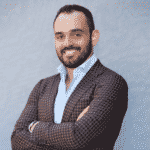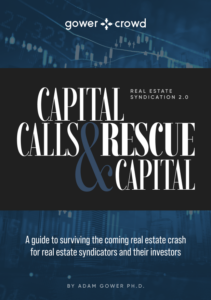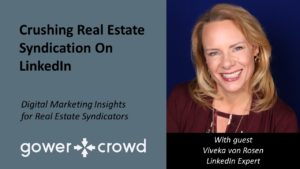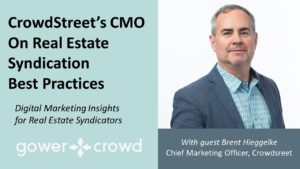Podcast Episode 315: Max Sharkansky, Managing Partner, Trion Properties
Using Crowdfunding to Finance Real Estate

Max oversees all aspects of acquisition, disposition, and property analysis for Trion Properties.
Since founding Trion, Max has led the acquisition, renovation and disposition of over $300,000,000 in mismanaged and distressed assets, primarily in multifamily, yielding an average IRR in excess of 30%.
He has been syndicating the opportunities his company uncovers to investors online for several years and is one of the most advanced experts in the field.
See below for more links to Max's online profiles.
What You're Going to Learn
* How to grow your equity pipeline
* What's involved in crowdfunding real estate projects
* Raising capital by selling shares
* The importance of going the extra mile
* Why you must educate investors to build trust
* How to build relationships with prospects online
* That building an online presence works
* Why crowdfunding is a good investment of time
And much, much more.
Listen To or Watch the Full Podcast Here
Show Highlights
Why You Must Educate Investors to Build Trust
Adam: So, now somebody goes on to one of these websites, and they see your name ... Sure, there's an element of trust, because it's on a reputable- what is becoming known as a reputable website - RealCrowd, or CrowdStreet, et cetera.
But, what's the first thing that they do? They're going to go on Google, they're going to run your name. and they're going to run Trion Properties. They're going to do research on you.
How are you managing that aspect of the digital world, when somebody- a brand-new investor, a high-net-worth individual is looking you up?
Max: Some of the other things we do to establish credibility for ourselves as a sponsor ... First of all, we do a lot of PR. We're always in GlobeSt, and National Real Estate Investor. You could see our deals and our thought-leadership pieces. We're always giving interviews and things of that nature.
Then, we also create our own content. We really do as good a job as possible of educating investors out there. You can go to our website, which we're now reworking, and you can read our education pieces talking about what to look for in a deal, what to look for a sponsor, what to look for in the marketplace. We talk about macro economy, micro economy, and some of our markets, and just the way we see the world, from both the shoes of a sponsor and the shoes of an investor.
How to Build a Relationship with Investors Online
Adam: What have you found to be the biggest challenges of moving this process of establishing a relationship? Look, when we first started chatting, the assumption was, when you were raising money from the guys at Marcus, et cetera, or HFF, or from friends and family, they knew you. They already knew you. They had a relationship with you.
So, now you're developing relationships with people that don't know you, online. What does that process look like? How do you think of that process as being similar or different from knowing somebody for years, and years, and years of having worked together with them or being actually related to them?
Max: Well, again, we try to just establish an online presence and an online personality. We try to give the investors as much value as possible. This goes back to education, and video, and we show our properties online; we show a lot of before and after. That's the best way, we feel, for us to establish online credibility.
Adam: Was that something that the real-estate websites- sorry, the crowdfunding websites have encouraged you to do, or is this something that you've taken on of your own initiative?
Max: A little bit of both. Some of these ideas came to us via the crowdfunding industry. Through our own initiative, we started- we decided to start doing it ourselves.
Adam: By doing it yourself, are you finding that the crowdfunding websites are consistently delivering full finance for specific deals or, as they get bigger, it gets harder to fill your own equity needs; that you need to go beyond them for marketing or for online work ...? Explain how those two things interact.
Max: Sure. Our own internet marketing to grow our database of investors is really a constant evolution. It's just something that's evergreen. We're always trying to acquire more investors and, ideally, get them into our fund.
When we're crowdfunding for a deal, the crowdfunding company usually tells us how much they feel they can raise, and that's the amount of allocation we'll carve out for them.
If we're buying a $30 million property with a $10 million equity check, and they say, "Max, we think, based on the metrics, based on location, the asset class, we can raise you $3.5 million."
I'll carve out $3.5 million for them, and other $6.5, we'll take investors, or we'll just fill it with our fund, and maybe one or two investors.
Does Building an Online Presence Work?
Adam: Have you found an uptick in the success of raising capital through the platforms or otherwise, as a result of your independent online activities?
Max: Well, it's hard for me to quantify how our independent online activities affect our raises on the platforms, but it absolutely has driven an increase in folks that come to our site directly, and call us, and email us.
Why Crowdfunding is a Good Investment of Time
Adam: Interesting. What I meant, actually, was in terms of production of your blog posts, or video, or even doing calls like this, for example, in terms of establishing the relationship with investors.
Obviously, it's a good thing, if the biggest issue you have to deal with is the amounts of positive inquiries that are coming in as a result of it; people wanting to get involved in your deals. In terms of the underlying foundation, is that- do you find time-consuming more than you would like, or about what you would like, or less?
Max: I think it's about what we expected. Of course, we're all busy, but if something is highly productive, and highly accretive, and there's a good return on our time investment, then we do it.
Growing Your Equity Pipeline
Adam: Let's talk about how you raise money. So, let's start with the old way. When you first started in 2005, what was the process? First, you get debt from a bank and then you need equity. How did you do that then?
Max: Debt is never the hard part. Debt's always the easy part, especially when you're buying apartment buildings. It's probably the most financeable asset class in America. It actually spoils you a little bit, when you try to get financing on something else. You're like, "Wait, why is this so difficult?"
Equity we did very organically. My partner and I, Mitch and I, we bought our first couple of properties with our own money. That runs out very quickly. Then we started to syndicate and just do very typical 'pass the hat' type syndications. I was-.
Adam: What's a 'pass the hat' syndication? What does that mean actually?
Max: You're passing the hat to every single human being in your phone book, every single human being in your office. I was talking to guys at Marcus and, of course, all those guys love to invest. Mitch is an HFF alum, and all of his colleagues were investing. We would pool the capital together - friends, family - and buy properties.
Adam: How did you do that? What was the actual process? When you say, "Pass the hat," you didn't literally ... Here, I've got a hat-
Max: No.
Adam: You didn't literally say, "Throw your money in there," right? Describe that process to me, what you mean-
Max: Sure. We drafted a PPM, or our lawyer drafted a PPM with a business plan in it, of course, and we would call everybody; we would tell them about the deal. That's how we would raise the money [cross talk] They would print out the PPM; they would sign the sub docs, they would sign the operating agreement, they would scan it and email it back to us.
Adam: How did you pitch, though? You didn't just send them the PPM. You had to explain ... You've got an apartment somewhere. What was the process for doing that?
Max: It's really not that much different than it is now in terms of the pitch, because people ... If someone's going to write a large check, and even if they're going to write a check for the bare minimum, which is $50,000, that's a fair amount of money.
They're going to want five-minute phone call, a 10-minute phone call. We set up the call or the meeting. Oftentimes, they'd ask to meet on site. We don't have that as much anymore, especially now that we're doing out-of-state deals, but back then, it was more local.
I should mention that we did grow geographically, as well, because we used to just do deals in our own backyard. I was a broker of apartment buildings in the San Fernando Valley, so naturally we started buying apartment buildings in San Fernando Valley.
Adam: Did you print out ... Did you put together a deal memo with pictures and the story line, or was it just the PPM, just a legal contract that you used, or did you use-
Max: We did both. We did a memo. We did a deal brief, or a memo, or whatever you want to call it, and the PPM. In that sense, that really hasn't changed. The only real difference is how we market it, the manner in which we send it out to our investors, and how they sign the documents.
Crowdfunding Your Real Estate Projects
Adam: When you talk about signing the documents, you're talking about, now, a technical component of the process, right? Instead of sending a PDF and having it emailed back, et cetera ... What I'm interested in is the workflow from when you were first raising money. Presumably, you called somebody, and then you ... You said a five-minute phone call, but presumably you had to send them the deal brief or you'd meet with them, and you'd hand it over and talk about it. Or, presumably, they already knew you, right?
Max: Right.
Adam: So, they already knew you before you actually pitched to them, so there was an element of familiarity with you. It was an existing relationship. They knew who you were. They knew you could do it - that you were able to deliver. How did you migrate to the online world? Tell me what that process was like.
Max: Well, the online world found me. I didn't find them. Well, I shouldn't say that ... I found them, in terms of crowdfunding. The first deal we ever crowdfunded was on RealCrowd. Great group. They did really well for us, and then we did a few deals with them.
Then we just started to talk to some other groups - CrowdStreet, Realty Mogul, RealtyShares, which is now defunct - and we did crowdfunding on all of those sites. Then we got a call from CrowdStreet saying they were rolling out this software product, and that this was going to be the next big thing in how to raise money.
It's just not about reaching out to new investors, or not just about reaching out to new investors, but also managing our current investor base, not just on the fundraising aspect of it, but after close, as well.
You're sending out your quarterly reports; you're sending out your financial statements, your K-1s, and everything is being done through this investor portal. It's also acting as kind of like a Dropbox, or a Box, where you're storing all of your files there, also.
The investors aren't constantly emailing us now, where they're saying, "Hey, I misplaced my K-1, or the quarterly report ..." We do still get those, but if they're correctly using their portal, it's all in there. That's the software product, and we've been using CrowdStreet - their software product - almost since inception.
Raising Capital by Selling Shares
Adam: Now, when you first moved to the online world with RealCrowd, what was your skepticism to actually taking your deals online? What was the resistance, if you had any, and what were the surprises that you had, when you first went online to try and presumably solicit from investors you'd never met before?
Max: You've known me for a long time. I have a pretty high tolerance of risk. The scary thing wasn't that, because the way I looked at it is it's like a publicly traded company. Tim Cook doesn't know who's trading Apple stock every day.
If I'm not familiar with my investor, I think that's okay. We took referrals all the time, and that's the old-school way of syndicating. You start with people that you know and then, as you make people money, word travels very fast, and they refer their friends and family to you.
So, I was already doing deals with people we didn't know. You're not going to have a personal relationship with every single one of your investors. We were right about that, because now we've got almost 400 active investors, and I don't know most of them. I haven't spoken to them. Someone in my office has, but a lot of these people just came via the internet. That was something we were comfortable with, correctly.
The only thing that really gave us pause was we had to pay a posting fee to RealCrowd, and we weren't sure if they were going to be able to raise the capital, because that model is based on a posting, and you have to take your risk.
Whereas the other LLC model, which was RealtyMogul, and RealtyShares - that's the broker-dealer model. They get paid based on success, so that's a different business model. They raise you a certain amount of money, you pay them a fee, and there's less risk.
The other component of the risk is execution risk. We're gonna need a certain amount of money at closing. Is the money going to be there when we're ready to close? We had some money; we had some liquidity that we were able to tap in the event that it wasn't there, so that was fine.
Go The Extra Mile to Succeed Online
Adam: Was there any difference between the way that you felt you were pitching, if you like, your deal, when you went online with RealCrowd versus the way you'd been doing it with friends and family before? Was there a shift in any way?
Max: I think the shift was moreso with the investor than with us, because the pitch ultimately is the same. I think the risk is with the investor, because they're just going on the internet; they're going on a website that's brand new. There's no credibility really, because these are all new companies. The entire industry is in its infancy, and they're finding these people who are collecting millions of dollars to buy real estate.
What we did- I would say the one change that we did is we went the extra mile to make the investors as comfortable as possible. I would invite them into our office so they could see that we have a real company, and we're not some fly-by-night group that's working out of a garage. I would meet them on site. I would show them the story. I would get them as comfortable as possible to invest with us.
Adam: How is that process evolving now? Because it's a few years since you did that. I know that you're working on some pretty intensive online strategies. How is your process of communicating and establishing that relationship - that relationship of trust - with investors, how is that evolving?
Max: Well, the industry of crowdfunding and raising capital on the internet is no longer in its infancy. Now you've got credibility. Now you've got trust. You've got a track record.
So, if we're going to put one of our properties on a platform, all of those groups that I mentioned can say, "We have already raised money for Trion, successfully, multiple times. They've hit their IRRs, and these guys are for real." That's a very powerful statement to be able to make to raise money online with complete strangers.
Adam: Right, but you don't rely just on the word of RealCrowd, or RealtyMogul, or CrowdStreet for your reputation. You're building your own reputation, as well. How are you doing that online?
Max: Our investors are ... Any prospective investor creates an account. They go into our investor portal. They look through our fund documents. Usually, that's the first deal they click on, and in there is a track record. They could see all the deals that we have in the portfolio. They could see all the deals we've closed - not just in our track record, but also the Offerings page.
They usually set a phone call. They call our office. We have a phone call for a few minutes. If they're looking at a specific deal, then we'll go through the rec comps, the sales comps, and all of this supporting analytics. I think that usually does a pretty good job of it.
Related to this episode:















